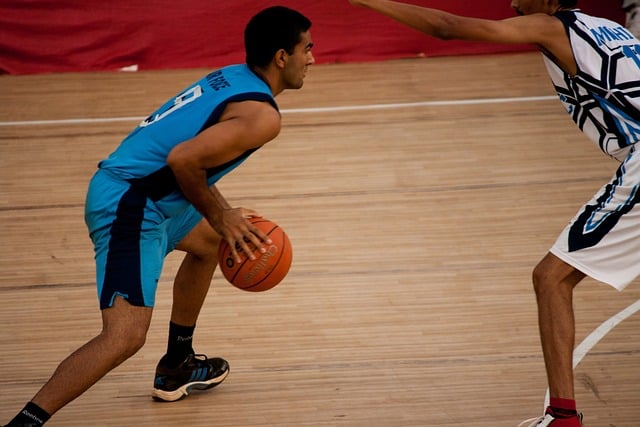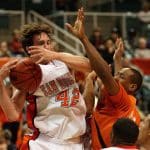When the game is on the line and the clock is ticking down, you’ve got two choices: either rise to the occasion or crumble under the weight of pressure. For basketball players, mental toughness is just as crucial as physical skill. You can have all the athletic ability in the world, but if you can’t handle the pressure, the game will pass you by. Building confidence on the court and learning how to perform under stress can be the difference between making the game-winning shot or missing it.
In this article, we’ll dive deep into how to develop basketball mental toughness, why it’s essential for success, and practical strategies to stay focused when the pressure is mounting.
1. Mental Toughness: Why It Matters in Basketball
Basketball is a game of runs. A team can be up by 20 points one minute, only to see that lead vanish in the blink of an eye. But the truly successful players, the ones who stand out in crucial moments, are the ones who can mentally withstand adversity. Mental toughness allows players to not only bounce back from mistakes but also rise above them and use them as fuel.
Let’s face it: no one plays a perfect game. Every player, even the NBA greats, misses shots, commits turnovers, and makes mistakes. But it’s not those errors that define a player—it’s how they respond to them. That’s the essence of mental preparation for basketball games: getting your mind right before, during, and after each play.
When pressure mounts, players with mental resilience tend to focus on what’s within their control. They focus on executing their skills, staying calm, and following through on their game plan. This is what separates good players from great ones.
Take Michael Jordan, for example. He wasn’t just known for his incredible skill and athleticism—he was known for his ability to thrive under pressure. Whether it was sinking game-winning shots or hitting clutch free throws in the finals, Jordan’s success was rooted in his mental training for performance.

2. Building Confidence on the Court
Confidence is one of the cornerstones of mental toughness in basketball. You need to believe in your skills and your ability to execute under pressure. Without confidence, even the best shot can feel like a gamble, and every defender will seem like an impenetrable wall.
So, how do you build confidence on the court? First, start with small wins. Don’t wait for the big moments to test your confidence. Practice consistently, and focus on perfecting your fundamentals. When you master the basics, your confidence will naturally grow because you’ll know you can handle the task at hand.
Also, remember that confidence doesn’t come from avoiding mistakes—it comes from learning from them. If you miss a shot, don’t dwell on it. Instead, treat each mistake as an opportunity to adjust and improve. Positive self-talk is key here. Instead of thinking, “I missed that shot; I’m terrible,” try reframing it to, “I missed that shot, but next time I’ll be ready.”
A big part of confidence is self-belief. When you trust in your abilities, you’ll perform at your best—even under the harshest conditions. In fact, some of the greatest comebacks in basketball history have been fueled by a team or player who refused to give up. If you’ve ever seen a player push through pain or exhaustion to score a game-winner, you’ve witnessed confidence in action.
3. Overcoming Adversity in Basketball
Basketball, like life, is full of obstacles. Injuries, missed shots, lost games—these are all inevitable parts of the game. But how you handle adversity is what sets you apart. Overcoming adversity in basketball isn’t just about physical recovery—it’s also about emotional resilience.
One of the biggest hurdles players face is the mental toll of failure. We all face setbacks—be it missing a last-second shot, being benched, or facing a difficult opponent. The key to overcoming these setbacks is learning how to bounce back quickly. In tough times, keep your head high and your thoughts positive.
Take the Miami Heat’s comeback in the 2012 NBA Finals as a prime example. Down 2-1 against the Oklahoma City Thunder, the Heat responded by dominating the remaining games and clinching the title. They didn’t let adversity shake their confidence. They had the mental toughness to take one game at a time and keep fighting.
Developing a strong mindset in basketball involves accepting that adversity will happen—and learning how to use it to fuel your drive. Every time you face adversity, ask yourself, “What can I learn from this?” Each setback is a chance to grow stronger.
4. Visualization Techniques for Athletes
The mind is a powerful tool in basketball. Visualization is one technique that can help players prepare mentally for high-pressure moments. Visualization involves mentally rehearsing specific situations, like hitting a game-winning shot or playing excellent defense during crunch time.
Top athletes like Kobe Bryant and LeBron James used mental imagery to imagine themselves performing at their peak before every game. By visualizing success, you’re training your mind to stay calm and confident when faced with real-life pressure situations.
A simple visualization exercise is to close your eyes and imagine yourself in the middle of a game. Picture the ball in your hands, feel the tension of the moment, and mentally execute the play you’d make under pressure. The more vivid and detailed the mental picture, the more effective this technique becomes.
Visualization not only boosts confidence, but it also helps reduce anxiety. By mentally preparing yourself for high-pressure moments, you become more comfortable with them. It’s like building a mental muscle—your brain becomes conditioned to handle stressful situations with clarity and calm.
5. Staying Focused During Games
Staying focused is crucial, especially when the game is on the line. The ability to block out distractions and focus on the task at hand is one of the most important aspects of mental toughness.
Players are constantly bombarded with distractions—whether it’s the crowd, trash talk from opponents, or the pressure of the moment. But great players know how to stay in the zone and focus on what matters most: executing the game plan.
One of the best ways to stay focused is to stay present. Don’t think about the last shot you missed or the upcoming possession. Focus on what you can control right now. Take a deep breath, reset your mind, and move on.
In the 2016 NBA Finals, LeBron James’ ability to stay focused on each possession, despite the mounting pressure, played a huge role in Cleveland’s victory. Even with the weight of history on his shoulders, LeBron stayed present and kept his eyes on the prize.
6. Handling Pressure Situations
Handling pressure situations in basketball is something that takes time to develop. It’s not something you can learn overnight. But with the right mindset, you can thrive when the game is on the line.
The first step in handling pressure is to embrace it. Players who dread pressure situations will often shrink away from them, but those who embrace pressure see it as an opportunity to showcase their skills. In fact, some players actually perform better under pressure because they know it’s their moment to shine.
One trick is to focus on the process, not the outcome. Instead of thinking about whether you’ll make the shot, focus on executing your form perfectly. This shifts the pressure from the result (making or missing) to the process (proper shooting form, footwork, etc.), which you have control over.
7. Practical Mental Training for Basketball Performance
Developing mental toughness takes practice, just like your physical skills. It’s not enough to just go through the motions during practice—mental training for performance must be an intentional part of your routine.
Start with mental conditioning drills. You can work on your focus by practicing in high-pressure scenarios—like shooting free throws with a countdown clock or playing against an opponent who is trash-talking. The key is to build your mental resilience so that, when the real pressure comes, you’re ready.
One effective drill is to practice mindful breathing. This technique helps you control anxiety and stay calm in high-pressure situations. Take deep, slow breaths to reset your mind and calm your nerves before a big shot or critical moment in the game.
Conclusion
Mental toughness is an invaluable asset for any basketball player looking to perform at the highest level. It allows you to build confidence on the court, overcome adversity, stay focused during games, and handle pressure situations with poise and composure.
By incorporating mental preparation techniques like visualization, learning how to embrace pressure, and practicing mindfulness, you can develop a strong mindset that will not only help you succeed on the court but also help you handle life’s challenges.
Remember, pressure is not something to fear—it’s an opportunity to rise to the occasion. By developing your mental toughness, you’ll be able to step up when it matters most and take your game to the next level.



